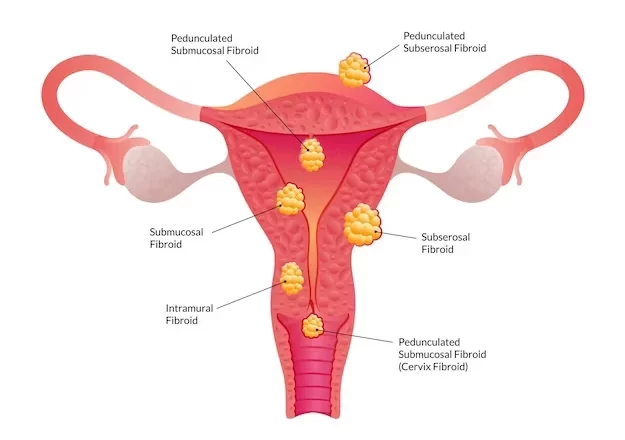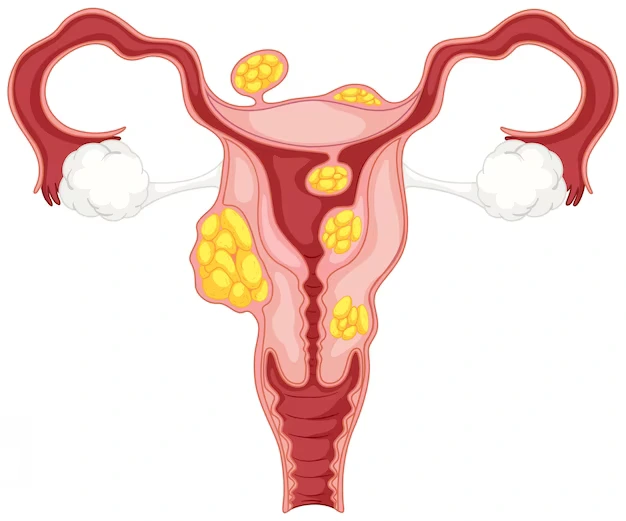Fibroids
Fibroids & Infertility
Fibroids are benign (non-cancerous) growths in the uterus (womb). They are a common cause of infertility, miscarriage and pre-term labour.
Fibroids are very common. At least 1 in 4 women develop one or more fibroids in their lifetime. They usually develop in women aged 30-50 years and can sometimes run in families. This is thought to be due to the higher levels of oestrogen that occur in heavier women.
Symptoms may include
- Heavy or more painful periods
- Miscarriage or infertility (depending on the size and position of the fibroid)
- Problems during pregnancy (early labour, risk of having a caesarean section)
- Diagnosis: Some fibroids can be felt on examining the abdomen if very large. An ultrasound scan is done to confirm the diagnosis

Treatment

If your fibroids are not causing any symptoms then treatment is not usually needed. After the menopause, fibroids often shrink and symptoms tend to go or ease.
Medication can be used to improve symptoms or to shrink the fibroids. Normally fibroids more than 3cms in size cause symptoms and need treatment.
A) Medication to improve symptoms
The following medicines are used to treat heavy periods whatever the cause, including heavy periods caused by fibroids. They may not work so well if your fibroids are large.
- Tranexamic acid- reduces bleeding during the period.
- The contraceptive pill may help you to have lighter periods and can often help with period pain too.
B) Medication to shrink the fibroids
Gonadotropin releasing hormone (GnRH) analogue, this is a hormone medicine that reduces the level of estrogen in your body. Fibroids shrink when the level of estrogen falls. This treatment is given for a maximum three to six months.
For patients with fibroids larger than 3cms Laparoscopic Myomectomy is the best way forward
Hysterectomy is commonest treatment for large fibroids which cause symptoms.
- Doctors
Our Specialist Doctors
Meet our team of specialized doctors dedicated to your fertility.

Dr. D. VENU MADHAV
MS, Laparoscopic & Bariatric Surgeon
Experience: 21 Years

Dr. D.V.S. RAMA KRISHNA PRASAD
M.S, Mch, Urologist / Andrologist
Experience: 38 Years

Dr. M.S. JUNAID BAIG
M.B.B.S, M.D. General Physician
Experience: 10 Years

Dr. G. JAYA BHARAT REDDY
MBBS, DA - Senior Anaesthetist
Experience: 30 Years
FREQUENTLY ASKED QUESTIONS
Get answers to your most asked questions promptly and accurately with our reliable information service.
To book an appointment online at our fertility center, visit our website and click on the Book an appointment button.
At our fertility center, we offer a range of specialized medical services including fertility consultations, fertility treatments, diagnostic testing, personalized treatments and cosmetics.
For information on insurance coverage and accepted plans, please contact our administrative staff directly or call us.
Yes, we offer telemedicine consultations, providing convenient and accessible virtual appointments for your fertility concerns. Schedule online or contact us.”
TESTIMONIALS
Thanks allah and dr sara today iam prganant thanks to all staff who help me more thanks nurses and receptions and thanks to sunita to help in home injections allll staff Fuaad Kamas2024-02-14I have come here and I have met the best doctors and nurses and I will defenitely recomment it.
Fuaad Kamas2024-02-14I have come here and I have met the best doctors and nurses and I will defenitely recomment it. Yasmin Abdi2024-02-13Alhamdulillah. Thanks to Allah .. thanks Dr Sarah Osman and all staff members.
Yasmin Abdi2024-02-13Alhamdulillah. Thanks to Allah .. thanks Dr Sarah Osman and all staff members. Mohammed Osman2024-02-09The service from the hospital staff was excellent especially Mrs.sunita and dr.sahra.
Mohammed Osman2024-02-09The service from the hospital staff was excellent especially Mrs.sunita and dr.sahra. Fardusa Farax2024-02-07Thanks to dr Sarah after 16yrs Iam pregnancy positive allamdulilah iam very happy today Secunderabad women’s hospital is best in Hyderabad dr Sara is very good taking with patients nicely and understand our problems and giving treatment thanks to all nurses staff and doctors and reception and pharmacy all staff who are working in hospital thanks each and everyone thanks once again to Sarah
Fardusa Farax2024-02-07Thanks to dr Sarah after 16yrs Iam pregnancy positive allamdulilah iam very happy today Secunderabad women’s hospital is best in Hyderabad dr Sara is very good taking with patients nicely and understand our problems and giving treatment thanks to all nurses staff and doctors and reception and pharmacy all staff who are working in hospital thanks each and everyone thanks once again to Sarah fadumo omar2024-02-06The hospital was very clear and hygiene. The nurse were there to help the doctor and take care of patients. This hospital are very usefull for me
fadumo omar2024-02-06The hospital was very clear and hygiene. The nurse were there to help the doctor and take care of patients. This hospital are very usefull for me Sameera Anjum2024-02-03This is good and supportive hospital ,which assist me to get pregnancy after long years,I'm very exciting being thier patient. Good response dhanalaxmi as a good I am very happily feal this movment
Sameera Anjum2024-02-03This is good and supportive hospital ,which assist me to get pregnancy after long years,I'm very exciting being thier patient. Good response dhanalaxmi as a good I am very happily feal this movment Azas2024-01-31Dr sarah is the best & staff is also supportive.
Azas2024-01-31Dr sarah is the best & staff is also supportive. Hayya Tabassum Qureshi2024-01-24alamdulillah i am today very happy i am pregnant Thank you dr sara Dr sara is very experienced doctor in fertility best doctor in hyderabad good staff Nurses and Doctors and operation theater Nurses and staff also very good and very patiency staff with dr sarah Thank you once again doctor sarah good hospital
Hayya Tabassum Qureshi2024-01-24alamdulillah i am today very happy i am pregnant Thank you dr sara Dr sara is very experienced doctor in fertility best doctor in hyderabad good staff Nurses and Doctors and operation theater Nurses and staff also very good and very patiency staff with dr sarah Thank you once again doctor sarah good hospital Daauud Saalax2024-01-19Thanks to dr sarah iam happy today because today iam pregnant. I thanks to all staff nurses doctors receptionist and lab and all working staff .staff is very good and helping nature .staff is very friendly also .i will advice people's to come hospitals for infertility. Dr sarah is best doctor in hyderabad....
Daauud Saalax2024-01-19Thanks to dr sarah iam happy today because today iam pregnant. I thanks to all staff nurses doctors receptionist and lab and all working staff .staff is very good and helping nature .staff is very friendly also .i will advice people's to come hospitals for infertility. Dr sarah is best doctor in hyderabad.... Hanab Duraan2024-01-18
Hanab Duraan2024-01-18
Fill The Form To Book An Appointment
Fill out the form below to secure your appointment with us. We look forward to assisting you.







